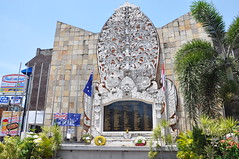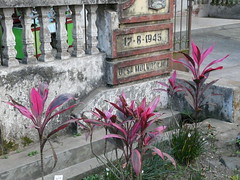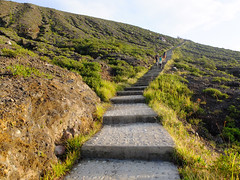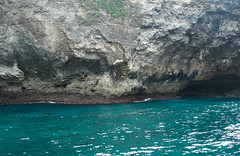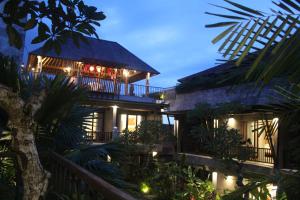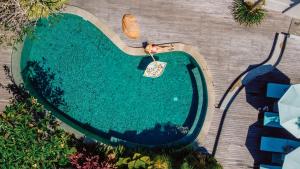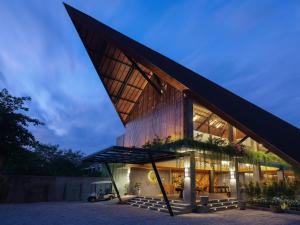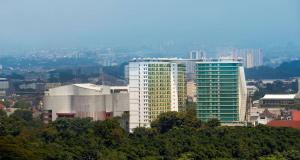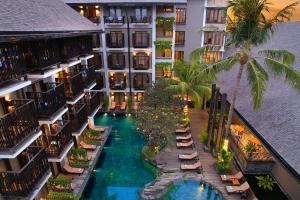 Indonesia
Indonesia
Indonesia, officially the Republic of Indonesia, is a country in Southeast Asia and Oceania between the Indian and Pacific oceans. It consists of over 17,000 islands, including Sumatra, Java, Sulawesi, and parts of Borneo and New Guinea. Indonesia is the world's largest archipelagic state and the 14th-largest country by area, at . With around 280 million people, Indonesia is the world's fourth-most populous country and the most populous Muslim-majority country. Java, the world's most populous island, is home to more than half of the country's population.
As the world's third largest democracy, Indonesia is a presidential republic with an elected legislature. It has 38 provinces, of which nine have special status. The country's capital, Jakarta, is the world's second-most populous urban area. Indonesia shares with Papua New Guinea, East Timor, and the eastern part of Malaysia, as well as maritime borders with Singapore, Vietnam, Thailand, the Philippines, Australia, Palau, and India. Despite its large population and densely populated regions, Indonesia has vast areas of wilderness that support one of the world's highest level of biodiversity.
The Indonesian archipelago has been a valuable region for trade since at least the seventh century, when the Srivijaya Kingdom formed trade links with China. Indonesian history has been influenced by foreign powers drawn to its natural resources. Under Indian influence, Hindu and Buddhist kingdoms flourished from the early centuries CE. Muslim traders later brought Islam, and European powers fought one another to monopolise trade in the Spice Islands of Maluku during the Age of Discovery. Following three and a half centuries of Dutch colonialism, Indonesia secured its independence after World War II. Indonesia's history has since been turbulent, with challenges posed by natural disasters, corruption, separatism, a democratisation process, and periods of rapid economic change.
Indonesia consists of thousands of distinct native ethnic and hundreds of linguistic groups, with Javanese being the largest. A shared identity has developed with the motto "Bhinneka Tunggal Ika" ("Unity in Diversity" literally, "many, yet one"), defined by a national language, cultural diversity, religious pluralism within a Muslim-majority population, and a history of colonialism and rebellion against it. The economy of Indonesia is the world's 16th-largest by nominal GDP and the 7th-largest by PPP. It is a regional power and is considered a middle power in global affairs. The country is a member of several multilateral organisations, including the United Nations, World Trade Organization, G20, and a founding member of the Non-Aligned Movement, Association of Southeast Asian Nations, East Asia Summit, D-8 and the Organisation of Islamic Cooperation.
Etymology
The name Indonesia derives from the Greek words and , meaning "Indian islands". The name dates back to the 19th century, far predating the formation of independent Indonesia. In 1850, George Windsor Earl, an English ethnologist, proposed the terms Indunesians—and, his preference, Malayunesians—for the inhabitants of the "Indian Archipelago or Malay Archipelago". In the same publication, one of his students, James Richardson Logan, used Indonesia as a synonym for Indian Archipelago. Dutch academics writing in East Indies publications were reluctant to use Indonesia. They preferred Malay Archipelago (Dutch: Maleische Archipel); the Netherlands East Indies , popularly ; the East ; and .
After 1900, Indonesia became more common in academic circles outside the Netherlands, and native nationalist groups adopted it for political expression. Adolf Bastian of the University of Berlin popularized the name through his book . The first native scholar to use the name was Ki Hajar Dewantara when in 1913, he established a press bureau in the Netherlands, .
History
Early history
Fossilised remains of Homo erectus, popularly known as the "Java Man", suggest the Indonesian archipelago was inhabited two million to 500,000 years ago. Homo sapiens reached the region around 43,000 BCE. Austronesian peoples, who form the majority of the modern population, migrated to Southeast Asia from what is now Taiwan. They arrived in the archipelago around 2,000 BCE and confined the native Melanesians to the far eastern regions as they spread east. Ideal agricultural conditions and the mastering of wet-field rice cultivation as early as the eighth century BCE allowed villages, towns, and small kingdoms to flourish by the first century CE. The archipelago's strategic sea-lane position fostered inter-island and international trade, including with Indian kingdoms and Chinese dynasties, from several centuries BCE. Trade has since fundamentally shaped Indonesian history.
From the seventh century CE, the Srivijaya naval kingdom flourished due to trade and the influences of Hinduism and Buddhism. At that time, ancient Indonesian sailors had made long voyages to Madagascar and East Africa. Between the eighth and tenth centuries CE, the agricultural Buddhist Sailendra and Hindu Mataram dynasties thrived and declined in inland Java, leaving grand religious monuments such as Sailendra's Borobudur and Mataram's Prambanan. The Hindu Majapahit kingdom was founded in eastern Java in the late 13th century, and under Gajah Mada, its influence stretched over much of present-day Indonesia. This period is often referred to as a "Golden Age" in Indonesian history.
The earliest evidence of Islamized populations in the archipelago dates to the 13th century in northern Sumatra. Other parts of the archipelago gradually adopted Islam, and it was the dominant religion in Java and Sumatra by the end of the 16th century. For the most part, Islam overlaid and mixed with existing cultural and religious influences, which shaped the predominant form of Islam in Indonesia, particularly in Java.
Colonial era
The first Europeans arrived in the archipelago in 1512, when Portuguese traders, led by Francisco Serrão, sought to monopolise the sources of nutmeg, cloves, and cubeb pepper in the Maluku Islands. Dutch and British traders followed. In 1602, the Dutch established the Dutch East India Company (VOC) and became the dominant European power for almost 200 years. The VOC was dissolved in 1799 following bankruptcy, and the Netherlands established the Dutch East Indies as a nationalised colony.
For most of the colonial period, Dutch control over the archipelago was tenuous. Dutch forces were engaged continuously in quelling rebellions both on and off Java. The influence of local leaders such as Prince Diponegoro in central Java, Imam Bonjol in central Sumatra, Pattimura in Maluku, and the bloody 30-year war in Aceh weakened the Dutch and tied up the colonial military forces. Only in the early 20th century did Dutch dominance extend to what was to become Indonesia's current boundaries.
The Japanese invasion and subsequent occupation during World War II ended Dutch rule and encouraged the previously suppressed independence movement. Two days after the surrender of Japan in August 1945, Sukarno and Mohammad Hatta, influential nationalist leaders, proclaimed Indonesian independence and were appointed president and vice-president, respectively.
The Netherlands attempted to re-establish their rule, and a bitter armed and diplomatic struggle ended in December 1949 when the Dutch formally recognised Indonesian independence in the face of international pressure. Despite extraordinary political, social, and sectarian divisions, Indonesians, on the whole, found unity in their fight for independence.
Post-World War II
As president, Sukarno moved Indonesia from democracy towards authoritarianism and maintained power by balancing the opposing forces of the military, political Islam, and the increasingly powerful Communist Party of Indonesia (PKI). Tensions between the military and the PKI culminated in an attempted coup in 1965. The army, led by Major General Suharto, countered by instigating a violent anti-communist purge that killed between 500,000 and one million people and incarcerated roughly a million more in concentration camps. The PKI was blamed for the coup and effectively destroyed. Suharto capitalised on Sukarno's weakened position, and following a drawn-out power play with Sukarno, Suharto was appointed president in March 1968. His "New Order" administration, supported by the United States, encouraged foreign direct investment, which was a crucial factor in the subsequent three decades of substantial economic growth.
Indonesia was the country hardest hit by the 1997 Asian financial crisis. It brought out popular discontent with the New Order's corruption and suppression of political opposition and ultimately ended Suharto's presidency. In 1999, East Timor seceded from Indonesia, following its 1975 invasion by Indonesia and a 25-year occupation marked by international condemnation of human rights abuses.
Since 1998, democratic processes have been strengthened by enhancing regional autonomy and instituting the country's first direct presidential election in 2004. Political, economic and social instability, corruption, and instances of terrorism remained problems in the 2000s; however, the economy has performed strongly in the last 15 years. Although relations among the diverse population are mostly harmonious, acute sectarian discontent and violence remain problematic in some areas. A political settlement to an armed separatist conflict in Aceh was achieved in 2005 following the 2004 Indian Ocean earthquake and tsunami that killed 130,000 Indonesians.
Geography
Indonesia lies between latitudes 11°S and 6°N and longitudes 95°E and 141°E. A transcontinental country spanning Southeast Asia and Oceania, it is the world's largest archipelagic state, extending from east to west and from north to south. The country's Coordinating Ministry for Maritime and Investments Affairs says Indonesia has 17,504 islands (with 16,056 registered …
Hotels Indonesia
Looking for places related to Indonesia?
Those are other destinations to find places related to Indonesia:

